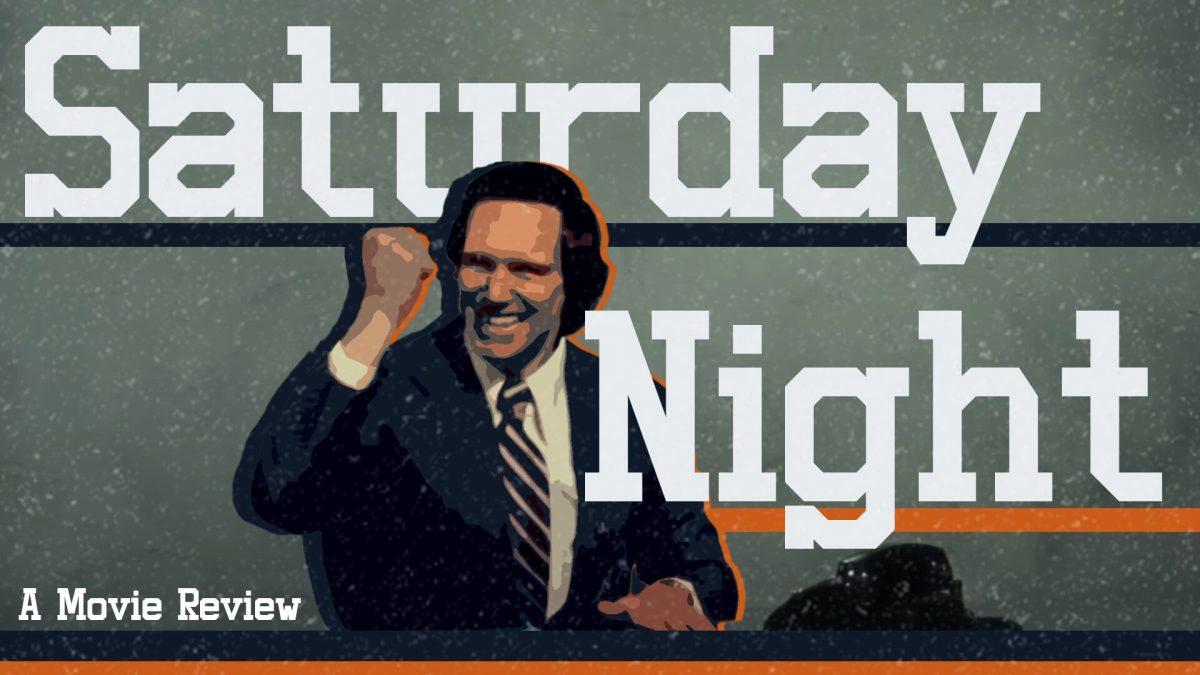
The “SNL” origin story takes to the big screen and honors a 50 year legacy
Picture the average child at any point within the last 50 years. It’s a Saturday night, and the television speakers light up with applause and signature trumpets as a face they only slightly recognize comes on screen. Peeking around the corner, they ask their parents what’s on TV, to which they respond “Saturday Night Live.”
In 1975, the very first episode of “Saturday Night Live” premiered with George Carlin as a host, starring then-unknown comedy icons like Dan Aykroyd and John Belushi. 50 seasons later, the show is still running, and Jason Reitman’s “Saturday Night,” is the dramatized retelling of the show’s premiere.
Perhaps my most anticipated film of the year, “Saturday Night” features a star-studded cast playing the cast and crew of the first “SNL” season. After the sketch comedy show raised generations of TV-watchers, expectations for an adaptation were relatively high.
Luckily, Reitman uses a variety of artistry to masterfully craft a nostalgic insight to the monumental television-changing night of Oct. 11, 1975.
The cast of this movie is by far the most incredible part. The resemblance between actor and real-life counterpart is, in multiple cases, uncanny- this is seen through the example of Matt Wood’s role as Belushi.
Even if they had looked wildly different, this combination of performers was genius. “The Maze Runner”’s Dylan O’Brien was unsurprisingly hilarious as Aykroyd, “New Girl”’s Lamorne Morris was quirky and charming as Garrett Morris, and of course every movie should have Rachel Sennott in it.
In the end,my personal actor standout was the incredible and underrated Andrew Barth Feldman as Neil Levy. More known in the Broadway world for his role as the titular Evan Hansen, Feldman starred in his first feature film “No Hard Feelings” last year, alongside Jennifer Lawrence.
In this, he plays the quirky and blubbering cousin/assistant to showrunner Lorne Michaels, which he nails down to the details. Feldman remains a consistently exciting addition to every scene he’s a part of. Every time he stumbles over his words, looks down in embarrassment or whips out his set of playing cards to perform a magic trick, the audience can’t help but be charmed.
As for the film itself, “Saturday Night” manages to encapsulate the feeling of absolute chaos throughout the entire movie. To paint the right picture, “Saturday Night”’s intense shouting matches and melodramatics could be compared to that of “The Bear”.
The camerawork leans into the use of long and intense single shots. This emphasizes the frantic drama surrounding the characters as the audience watches everything go down in real time. There’s also a fair share of shouting, cursing and fighting — making for quite the entertaining watch.
Something is always happening during “Saturday Night.” Voices overlap, character motives are flying every which way, and there’s a character who spends the entire movie running into scenes to burn sage for good luck. If there’s anything to say about it, it’s that you could never possibly be bored.
My one fear for the movie leading up to its release was how the humor would turn out. “SNL” itself is a comedy show, but typically has its hits or misses. I figured that actors like Sennott, who I personally find extremely funny, would be able to save the script.
Not only were the jokes witty, but the comedic timing of the actors were impeccable. Tommy Dewey as writer and performer Michael O’Donoghue probably made me laugh the most, with a snarky, know-it-all tone, a dry quip and a passive smile. Though he wasn’t the most relevant character, I found myself wishing he’d come back on screen just so he could crack another joke.
I suppose it could be argued that “Saturday Night” relies more on its star power and nostalgia than on an actual plot. The sheer amount of characters can get overwhelming, the camera can sometimes move a bit too fast and it’s hard to keep track of who is attempting to do what — and what still needs to be done.
I think I’m more sympathetic to this product than a warped, cheesy plotline that would distract from what the film is trying to achieve. “Saturday Night” is not meant to be a feel-good inspiring tale — it’s meant to be a spectacle. The costumes, the comedy, the cameras, the actors, the music — it’s all meant to wow you rather than evoke you.
If you’re looking for something life-changing, maybe scurry over to see John Crowley’s “We Live In Time” for a good cry. If you’re looking for something fun, refreshing and a modern example of what makes movies so good, “Saturday Night” is not only a good pick, but perhaps the best.
Edited by Ava McCluer | [email protected]
Copyedited by Maggie Atkinson and Hannah Taylor | [email protected]
Edited by Emily Skidmore | [email protected]